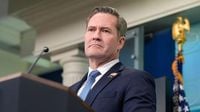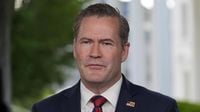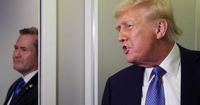In a significant reshuffle within the Trump administration, National Security Adviser Mike Waltz and his deputy, Alex Wong, are set to depart from their positions, as reported on May 1, 2025. This change comes on the heels of Waltz’s nomination by President Donald Trump to serve as the next U.S. Ambassador to the United Nations, a role that Trump announced via social media.
Waltz, a retired Army Green Beret and former Republican lawmaker from Florida, has been in the spotlight due to a scandal involving a Signal chat among national security aides. The controversy arose when Waltz mistakenly included The Atlantic editor Jeffrey Goldberg in a discussion about sensitive military operations, leading to internal scrutiny and criticism. Trump had previously defended Waltz, calling the incident a “mistake,” but it appears that the fallout from this event has contributed to his exit from the National Security Council (NSC).
In a post on Truth Social, Trump praised Waltz’s dedication, stating, “From his time in uniform on the battlefield, in Congress, and as my National Security Advisor, Mike Waltz has worked hard to put our Nation’s Interests first.” He also announced that Secretary of State Marco Rubio would take on the role of interim national security adviser while continuing his duties at the State Department.
This transition marks a notable shift, as it is the first time since Henry Kissinger held both positions in the 1970s that one individual has served as both Secretary of State and National Security Adviser simultaneously. Trump remarked, “When I have a problem, I call up Marco. He gets it solved,” highlighting his trust in Rubio’s capabilities.
Waltz’s departure is part of a broader trend of personnel changes within the Trump administration, particularly within the NSC. Reports indicate that the NSC has seen a wave of firings, with over 20 staff members dismissed in recent weeks, often without notice. This has raised concerns about the morale and expertise within the national security apparatus, as some officials have noted difficulties in attracting high-level talent amidst the turmoil.
Waltz’s tenure as national security adviser was marked by challenges, particularly following the Signal chat incident, which involved discussions about a potential military strike on Houthi targets in Yemen. The presence of a journalist in that chat raised alarms about the handling of sensitive information. Sources close to the administration suggest that Waltz’s perceived hawkishness may have also contributed to his ouster, as he was seen as not effectively coordinating foreign policy among various agencies.
In the wake of Waltz’s departure, Alex Wong, who served as the Principal Deputy National Security Adviser, is also stepping down. Wong previously played a crucial role in the Trump administration’s dealings with North Korea and was credited with helping to negotiate the high-profile summit between Trump and North Korean leader Kim Jong Un. His exit further underscores the shifting dynamics within the administration as it navigates complex international relations.
The timing of these departures coincides with a period of heightened scrutiny for the Trump administration, particularly following the Signal leak and ongoing investigations into various aspects of its operations. Critics have voiced concerns regarding the administration’s transparency and adherence to federal records laws, with nonprofit watchdog American Oversight stating that the behavior of Waltz and Wong reflects deeper systemic issues within the administration.
As the Trump administration moves forward, the appointment of Marco Rubio as interim national security adviser could signal a shift in approach, particularly regarding U.S. relations with traditional allies and adversaries alike. Rubio’s extensive experience in foreign affairs may offer a stabilizing influence during this tumultuous period.
In addition to the personnel changes, the Trump administration is also facing significant legal challenges. On the same day that Waltz and Wong’s departures were announced, the administration filed a lawsuit against several major insurance companies, accusing them of engaging in illegal kickbacks related to Medicare Advantage plans. This legal battle adds another layer of complexity to the administration’s agenda as it seeks to navigate both domestic and international issues.
Furthermore, the administration is under pressure from Senate Democrats who are demanding transparency regarding deportations and the handling of immigration cases. This comes amid ongoing debates about the administration’s immigration policies and their impact on communities across the United States.
As the Trump administration grapples with these challenges, the departure of Waltz and Wong marks a pivotal moment in its national security strategy. The administration’s ability to effectively manage its foreign policy and maintain stability within its ranks will be closely watched in the coming weeks and months.
In conclusion, the reshuffling of key national security positions within the Trump administration reflects both the internal pressures facing the administration and the complexities of navigating a rapidly changing global landscape. With Marco Rubio stepping in as interim national security adviser, the administration may seek to recalibrate its approach to international relations while addressing the ongoing challenges posed by legal and political scrutiny.






